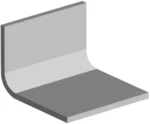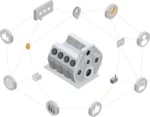Copper
Copper (Cu) is a chemical element that can be classified as a non-ferrous metal. The soft and tough non-ferrous metal is one of the first metals to be used in numerous products and is primarily known for its characteristic reddish color. Copper is mostly used for alloys such as bronze or brass. It is also suitable for electrical components due to its high conductivity. Copper is usually obtained through mining.
Copper is generally divided into two groups: Pure copper and copper as part of alloys. Pure copper has both very high thermal and electrical conductivity and is therefore mainly used in applications where this property is essential. These can be cables, for example. There are also copper alloys. The alloys bronze (copper-tin alloy) and brass (copper-zinc alloy) are particularly widespread, as they have improved mechanical properties. Another alloy is beryllium copper, which is particularly suitable for demanding industrial applications.
Due to its positive properties, copper is used for numerous applications. Due to its excellent conductivity, pure copper, also known as electrolytic copper, is the first choice in the electrical industry and can be used in electrical cables or components, for example. However, its electrical properties can also be used in the manufacture of solar and wind power plants or motor components. Finally, copper alloys are mainly used to protect against corrosion. You will find all the necessary information about our copper alloys in the table below.

The various copper alloys
| DIN/ISO | |||
|---|---|---|---|
| Cu-ETP | • good forgeability • excellent polishability • good galvanizability | Electronics production, Sheet metal processing, Assembly manufacturing | |
| Cu-DHP | • good forgeability • excellent polishability • worthy formability | Electronics production, Sheet metal processing, Assembly manufacturing | |
| 2.1247 | • very high strength • excellent polishability • worthy formability | Electronics production, Sheet metal processing, Assembly manufacturing | |
| 2.1293 | • high strength • excellent polishability • worthy cold formability | Electronics production, Sheet metal processing, Assembly manufacturing | |
| 2.1052 | • very high wear resistance • excellent polishability • suitable for numerous casting processes | Electronics production, Sheet metal processing, Assembly manufacturing, Casting processes | |
| 2.1030 | • very high strength • excellent polishability • worthy sliding properties | Electronics production, Sheet metal processing, Assembly manufacturing | |
| 2.1090 | • excellent machinability • worthy sliding properties • galvanizable | Electronics production, Sheet metal processing, Assembly manufacturing, CNC | |
| 2.0402 | • very high machinability • excellent polishability • worthy formability | Electronics production, Sheet metal processing, Assembly manufacturing | |
| 2.0401 | • very high machinability • galvanizable • worthy formability | Electronics production, Sheet metal processing, Assembly manufacturing | |
| 2.0321 | • very high solderability • excellent polishability • worthy formability | Electronics production, Sheet metal processing, Assembly manufacturing |
Copper: Pros and Cons
Pros
Copper is primarily known for two properties: electrical conductivity and thermal conductivity. Compared to other metals, copper has the best electrical conductivity, making it the material of choice for numerous applications such as power cables or electrical components. Thanks to its excellent thermal conductivity, copper can also be used in other products such as heat exchangers or cooling systems such as air conditioning systems. Another advantage and difference compared to other metals is the high corrosion resistance that copper already has by nature. As a result, copper is used not only in the electrical industry but also in the construction industry, especially for products that come into contact with water, such as pipelines or roofing.Translated with DeepL.com (free version)
Cons
Due to the difficulty of extracting copper and the increasing demand for copper, the price of the metal has risen in recent years. Copper is therefore somewhat more expensive than other metals such as aluminum, but is essential in numerous electronic products due to its high conductivity. In addition, copper can be susceptible to corrosion in certain aggressive environments, such as salt water. The so-called "patina", a greenish thin layer on the surface of the metal, indicates progressive corrosion. Finally, it is important to note that copper only retains its excellent properties if it is free from impurities. With recycled copper, special care must therefore be taken to ensure that the copper remains pure.
Further Resources
Book personal meeting
Contact Us
* By submitting the form, you agree to the assemblean privacy policy.


